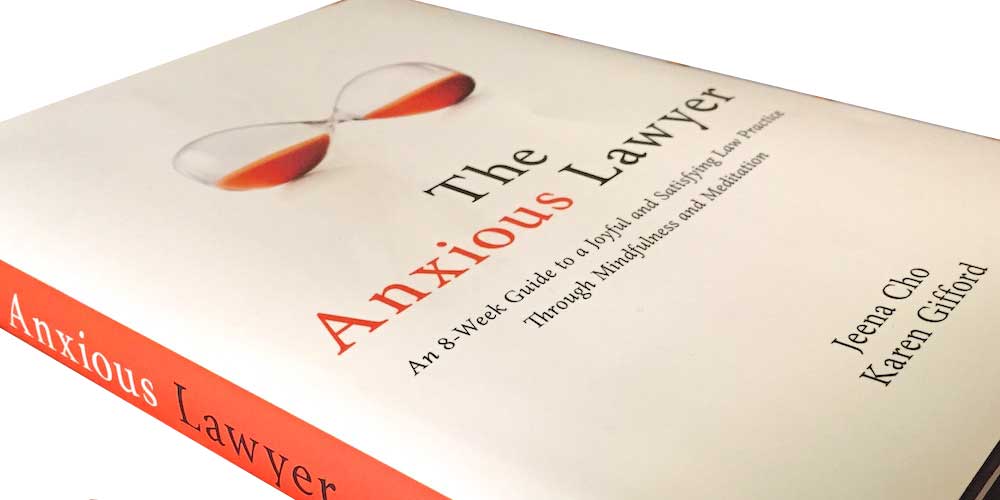
Book Review: The Anxious Lawyer
An 8-Week Guide to a Joyful and Satisfying Law Practice Through Mindfulness and Mediation
Years ago when I was a practicing litigator, I handled a case that involved allegations of elder abuse and undue influence between two siblings following their mother’s death. In many respects it was not that different than many other cases. The same facts that created the inference of undue influence were also evidence that one child had done all of the care taking while the other was not around. There were a lot of hurt feelings and misunderstandings that stemmed, as many of these kind of cases do, from a lifetime of slights, actions, hurts and complicated relationships. In the end, we achieved one of the best legal results of my litigation career, but I wasn’t happy. I felt deeply sad. The family was torn apart, not just by their mother’s death, but by the allegations and litigation process itself. I knew that wasn’t what their mother would have wanted. I felt instinctively that there had to be a better way.
I know that I am not alone in that thought. I know there are attorneys out there who are working hard every day to find that better way – the way that heals not only their clients, but themselves as well. As Jeena Cho said to me recently, “there is a hunger to think about a different way of practicing.” This book, The Anxious Lawyer, is about that “different way of practicing.” It offers an alternative to the aggressive, winner-take-all approach that allows for a more open, even joyful mindset, but it is not “soft” or “hippy dippy.” Instead, it is a practical approach to mediation and mindfulness, directed at attorneys with the admonition to “be kind to yourself. Being a lawyer is difficult.” (pg.144).
The Anxious Lawyer sets out an 8-week program of mediation and mindfulness, but don’t be put off by that investment of time. It is not an hour a day and it is not “another thing to do.” It starts small and stays do-able, giving one step at a time in increments of the reader’s choosing. The authors point out that meditation is nothing more than mental training (something attorneys are usually pretty good at)– it is a means of “settling and focusing the mind.” (p. 11). It sounds very simple, but as lawyers, we are trained to keep thinking – continuously– so many lawyers resist this quieting of the mind. Like everything else, it takes practice to attain, but the benefits can be well worth it.
What are those benefits? Well, interestingly, according to Cho and Gifford, they accrue to both attorneys and their clients. For example, practicing mindfulness can help us to notice when our bodies and minds are reacting in a negative way, when we are starting to get angry or agitated and our minds start to close because we “already know how this is going to go.” If we can notice when this is beginning, it creates a moment of choice. We don’t have to get angry or upset. We can choose to settle our bodies and quiet our minds. Doing so allows our minds to be open to receive the information coming at us and it allows us to see all of the opportunities before us. This could mean that we see the important fact that is almost “thrown away” in a sea of words, or it could mean that we are open to the creative solution that comes when we show compassion or empathy for our opponents and try to understand their needs as well as our own. As the practice of law moves toward a more cooperative approach centered on problem solving, these are skills that will serve us– and our clients– well.
There is no way for me to list all of the insights gained from reading this book in one review, but I will say this, when I was looking for that “better way,” I chose to change my entire practice and become a mediator, and as such I found that most, if not all, of the skills that the authors focus on in this book are skills that most mediators use all of the time to help you settle your cases. Developing those skills yourself could give you new tools for your practice and new ways to serve your clients, all while helping you manage your stress.
If you are open to concepts of mediation and mindfulness, if you feel that your practice is inherently negative and stressful and you are looking for a way to change that, I think this book could give you a good start. Cho and Gifford didn’t just write this book, they live it. They both practice meditation and mindfulness and both saw the difference in themselves and their practice. Additionally, the fact that it is written by lawyers, for lawyers, means that the authors understand about your busy schedule and the fact that sometimes it is necessary to be aggressive and push for your client, but they also know the toll it takes on you to do that all of the time, and they are offering you another way. A new year is starting… what is your resolution?